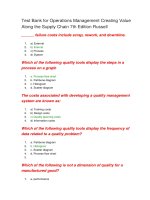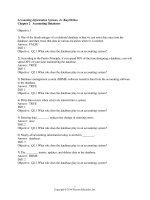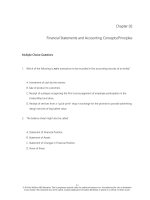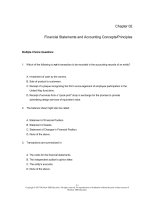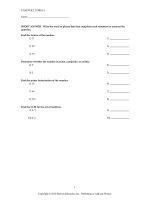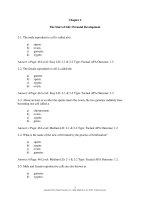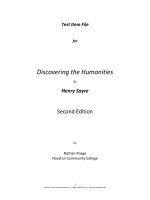Managing operations across the supply chain 2nd edition swink test bank
Bạn đang xem bản rút gọn của tài liệu. Xem và tải ngay bản đầy đủ của tài liệu tại đây (261.27 KB, 22 trang )
Chapter 02
Operations and Supply Chain Strategy
Multiple Choice Questions
1.
Corporate strategic planning involves decisions related to:
A. What businesses should we be in?
B. What specific product- and market-based initiatives and goals should we establish?
C. What measures should we use to control strategic initiatives?
D. All of these.
2.
Functional strategic planning involves decisions related to:
A. What businesses should we be in?
B. Specific product- and market-based initiatives and goals.
C. What metrics should be used to ensure progress in operations management?
D. All of these.
2-1
© 2014 by McGraw-Hill Education. This is proprietary material solely for authorized instructor use. Not authorized for sale or distribution
in any manner. This document may not be copied, scanned, duplicated, forwarded, distributed, or posted on a website, in whole or part.
3.
A well-designed value proposition possesses four characteristics. Which of the following is NOT
one of those characteristics?
A. It offers the highest product quality in each quality dimension.
B. It differentiates the firm from its competition in a way that is difficult to imitate.
C. It satisfies the financial and strategic objectives of the firm.
D. It can be reliably delivered given the operational capabilities of the firm and its supporting
supply chain.
4.
Which of the following is the most appropriate definition of an "order winner"?
A. A product characteristic that causes customers to choose the product over that of a competitor.
B. A product characteristic that permits the product to compete in a market.
C. A product that has the highest profit margin.
D. A product that generates the highest dollar sales volume.
5.
Which of the following is NOT true about "order qualifiers"?
A. These are product traits that must meet a certain level in order for the product to even be
considered by customers.
B. The firm must perform acceptably on these traits, usually at least as well as competitors'
offerings.
C. Customers may not be aware of any level of performance in excess of those minimum levels
that they have established.
D. All of the above are true about order qualifiers.
2-2
© 2014 by McGraw-Hill Education. This is proprietary material solely for authorized instructor use. Not authorized for sale or distribution
in any manner. This document may not be copied, scanned, duplicated, forwarded, distributed, or posted on a website, in whole or part.
6.
Xanadu makes HD televisions. It claims that its HD televisions have the clearest picture clarity in the
industry. Xanadu is emphasizing which dimension of quality?
A. Reliability
B. Performance
C. Features
D. Conformance
7.
Scantron Inc. claims that its competitors have to recall 10 percent of their products to fix defects,
while it only has to recall 5 percent. Scantron is emphasizing which dimension of quality?
A. Durability
B. Reliability
C. Performance
D. Conformance
8.
Which of the following is considered a "process-related" competitive priority?
A. Flexibility
B. Quality
C. Cost
D. All of these
2-3
© 2014 by McGraw-Hill Education. This is proprietary material solely for authorized instructor use. Not authorized for sale or distribution
in any manner. This document may not be copied, scanned, duplicated, forwarded, distributed, or posted on a website, in whole or part.
9.
Xanadu Inc. claims that its manufacturing processes result in fewer greenhouse gases than those of
its primary competitors. This suggests that Xanadu has a focus on:
A. Risk management.
B. Sustainability.
C. Flexibility.
D. Profitability.
10. Which of the following is NOT considered a key characteristic of a core capability:
A. It is based on factors that are rare or unique to the firm.
B. It is hard to imitate.
C. It does not need to be extendable to many market opportunities.
D. There are few substitutes for it.
11. "When operational capabilities are consistent with and supportive of the value proposition and the
outcomes desired by critical customers" best describes the concept of:
A. Execution.
B. Flexibility.
C. Strategic planning.
D. Fit.
2-4
© 2014 by McGraw-Hill Education. This is proprietary material solely for authorized instructor use. Not authorized for sale or distribution
in any manner. This document may not be copied, scanned, duplicated, forwarded, distributed, or posted on a website, in whole or part.
12. A vice president of operations wants to evaluate the impact of reducing manufacturing expenses
on the firm's return on assets. A measurement approach that he might consider for this is the:
A. Strategic profit model.
B. Balanced scorecard model.
C. SCOR model.
D. None of these.
13. You are an upper-level manager in a firm. You believe that corporate objectives are not effectively
disseminated throughout the organization and that line-level managers do not take them into
account in their decision making. Which of the following would best help you to try to correct this
problem?
A. Strategic profit model.
B. Balanced scorecard model.
C. Maslow's needs model.
D. SCOR model.
14. Which of the following is a measure common to both the strategic profit model and the SCOR
model?
A. Responsiveness
B. Return on assets
C. Delivery performance
D. Lead time
2-5
© 2014 by McGraw-Hill Education. This is proprietary material solely for authorized instructor use. Not authorized for sale or distribution
in any manner. This document may not be copied, scanned, duplicated, forwarded, distributed, or posted on a website, in whole or part.
15. The performance measurement approach that would be most useful in measuring and describing
supply chain processes would be:
A. Strategic profit model.
B. Balanced scorecard.
C. SCOR model.
D. All of these.
16. Which of the following is the most appropriate definition of a core capability?
A. A set of products unique to a firm.
B. Technical capabilities of a firm.
C. Reputation.
D. Production/design processes unique to the firm.
17. Which of the following is NOT a component of the business model?
A. Critical customer
B. Value proposition
C. Desired outcome statement
D. System capabilities
2-6
© 2014 by McGraw-Hill Education. This is proprietary material solely for authorized instructor use. Not authorized for sale or distribution
in any manner. This document may not be copied, scanned, duplicated, forwarded, distributed, or posted on a website, in whole or part.
18. A company with a number of physically separate plants has a centralized tool room. This tool
room in the past has been responsible for emergency repairs. Whenever equipment (e.g., a
spindle, boring machine, transfer line) in one of these separate plants breaks down, the affected
items are brought to the tool room, where they are repaired. In some cases, the breakdowns affect
production schedules. In other cases, the breakdowns are more annoying but do not adversely
affect schedules. Complicating the operations in the tool room is the fact that many of the plans
for the equipment are incomplete or out-of-date, thus resulting in "make from sample" requests
(the broken part is provided and the tool room is asked to make the replacement piece just like
the broken part). It is difficult to predict what equipment will break down and when. Furthermore,
the company owns a wide variety of equipment. What are the order winners and order qualifiers in
this scenario?
A. Option A
B. Option B
C. Option C
D. Option D
2-7
© 2014 by McGraw-Hill Education. This is proprietary material solely for authorized instructor use. Not authorized for sale or distribution
in any manner. This document may not be copied, scanned, duplicated, forwarded, distributed, or posted on a website, in whole or part.
19. Currently, our system is characterized by a lack of fit between what the customer wants and what
the SCM system is best able to provide. As a result, which of the following would apply?
I. The firm must change the market segment it is going after.
II. Unless something is done, our firm will not be the most effective and efficient long-term
supplier.
III. Any firm can successfully counter such inconsistencies through the use of patents and
aggressive advertising.
A. I only.
B. II only.
C. III only.
D. I and II only.
E. I, II, and III.
20. Which three elements make up the triple bottom line?
A. Planet, Pollution, Profit.
B. Pollution, Equality, People.
C. Profit, Equality, Pollution.
D. People, Profit, Planet.
2-8
© 2014 by McGraw-Hill Education. This is proprietary material solely for authorized instructor use. Not authorized for sale or distribution
in any manner. This document may not be copied, scanned, duplicated, forwarded, distributed, or posted on a website, in whole or part.
Chapter 02 Operations and Supply Chain Strategy Answer Key
Multiple Choice Questions
1.
Corporate strategic planning involves decisions related to:
A. What businesses should we be in?
B. What specific product- and market-based initiatives and goals should we establish?
C. What measures should we use to control strategic initiatives?
D. All of these.
Corporate strategic planning is very broad and relates to what businesses the company should
be involved in.
AACSB: Reflective Thinking
Blooms: Remember
Learning Objective: 02-01 Describe how operations strategy fits within a firm's overall strategic planning process.
Level of Difficulty: 1 Easy
Topic Area: Levels of Strategic Planning
2-9
© 2014 by McGraw-Hill Education. This is proprietary material solely for authorized instructor use. Not authorized for sale or distribution
in any manner. This document may not be copied, scanned, duplicated, forwarded, distributed, or posted on a website, in whole or part.
2.
Functional strategic planning involves decisions related to:
A. What businesses should we be in?
B. Specific product- and market-based initiatives and goals.
C. What metrics should be used to ensure progress in operations management?
D. All of these.
Functional planning includes decisions regarding appropriate metrics for the specific functions
in a business unit.
AACSB: Reflective Thinking
Blooms: Remember
Learning Objective: 02-01 Describe how operations strategy fits within a firm's overall strategic planning process.
Level of Difficulty: 1 Easy
Topic Area: Levels of Strategic Planning
3.
A well-designed value proposition possesses four characteristics. Which of the following is NOT
one of those characteristics?
A. It offers the highest product quality in each quality dimension.
B. It differentiates the firm from its competition in a way that is difficult to imitate.
C. It satisfies the financial and strategic objectives of the firm.
D. It can be reliably delivered given the operational capabilities of the firm and its supporting
supply chain.
Providing value does not require the highest quality in each dimension of quality.
AACSB: Reflective Thinking
Blooms: Remember
Learning Objective: 02-02 Describe the need for "fit" between the critical customers; value propositions; and operations
capabilities-the essential elements that define an operations strategy.
Level of Difficulty: 1 Easy
2-10
© 2014 by McGraw-Hill Education. This is proprietary material solely for authorized instructor use. Not authorized for sale or distribution
in any manner. This document may not be copied, scanned, duplicated, forwarded, distributed, or posted on a website, in whole or part.
Topic Area: Developing Operations Strategy: Creating Value through Strategic Choices
4.
Which of the following is the most appropriate definition of an "order winner"?
A. A product characteristic that causes customers to choose the product over that of a
competitor.
B. A product characteristic that permits the product to compete in a market.
C. A product that has the highest profit margin.
D. A product that generates the highest dollar sales volume.
Order winners are traits that cause customers to actually choose a specific product.
AACSB: Reflective Thinking
Blooms: Remember
Learning Objective: 02-03 Describe customer-desired outcomes in terms of order winners; order qualifiers; and order losers.
Level of Difficulty: 1 Easy
Topic Area: Developing Operations Strategy: Creating Value through Strategic Choices
2-11
© 2014 by McGraw-Hill Education. This is proprietary material solely for authorized instructor use. Not authorized for sale or distribution
in any manner. This document may not be copied, scanned, duplicated, forwarded, distributed, or posted on a website, in whole or part.
5.
Which of the following is NOT true about "order qualifiers"?
A. These are product traits that must meet a certain level in order for the product to even be
considered by customers.
B. The firm must perform acceptably on these traits, usually at least as well as competitors'
offerings.
C. Customers may not be aware of any level of performance in excess of those minimum levels
that they have established.
D. All of the above are true about order qualifiers.
The characteristics described are all characteristics of order qualifiers, not order winners or
losers.
AACSB: Reflective Thinking
Blooms: Remember
Learning Objective: 02-03 Describe customer-desired outcomes in terms of order winners; order qualifiers; and order losers.
Level of Difficulty: 2 Medium
Topic Area: Developing Operations Strategy: Creating Value through Strategic Choices
6.
Xanadu makes HD televisions. It claims that its HD televisions have the clearest picture clarity in
the industry. Xanadu is emphasizing which dimension of quality?
A. Reliability
B. Performance
C. Features
D. Conformance
Picture clarity is a basic performance dimension of HD televisions.
AACSB: Reflective Thinking
Blooms: Apply
2-12
© 2014 by McGraw-Hill Education. This is proprietary material solely for authorized instructor use. Not authorized for sale or distribution
in any manner. This document may not be copied, scanned, duplicated, forwarded, distributed, or posted on a website, in whole or part.
Learning Objective: 02-04 Explain what product-related and process-related operational competitive priorities are; and how they
are related to competitive advantage.
Level of Difficulty: 2 Medium
Topic Area: Developing Operations Strategy: Creating Value through Strategic Choices
7.
Scantron Inc. claims that its competitors have to recall 10 percent of their products to fix
defects, while it only has to recall 5 percent. Scantron is emphasizing which dimension of
quality?
A. Durability
B. Reliability
C. Performance
D. Conformance
Defects are an indication of lack of conformance.
AACSB: Reflective Thinking
Blooms: Apply
Learning Objective: 02-04 Explain what product-related and process-related operational competitive priorities are; and how they
are related to competitive advantage.
Level of Difficulty: 2 Medium
Topic Area: Developing Operations Strategy: Creating Value through Strategic Choices
2-13
© 2014 by McGraw-Hill Education. This is proprietary material solely for authorized instructor use. Not authorized for sale or distribution
in any manner. This document may not be copied, scanned, duplicated, forwarded, distributed, or posted on a website, in whole or part.
8.
Which of the following is considered a "process-related" competitive priority?
A. Flexibility
B. Quality
C. Cost
D. All of these
Quality and cost are product-related. Flexibility is process related.
AACSB: Reflective Thinking
Blooms: Remember
Learning Objective: 02-04 Explain what product-related and process-related operational competitive priorities are; and how they
are related to competitive advantage.
Level of Difficulty: 1 Easy
Topic Area: Developing Operations Strategy: Creating Value through Strategic Choices
9.
Xanadu Inc. claims that its manufacturing processes result in fewer greenhouse gases than
those of its primary competitors. This suggests that Xanadu has a focus on:
A. Risk management.
B. Sustainability.
C. Flexibility.
D. Profitability.
Maintaining operations that are profitable and nondamaging to the environment is
sustainability.
AACSB: Ethics
Blooms: Remember
Learning Objective: 02-04 Explain what product-related and process-related operational competitive priorities are; and how they
are related to competitive advantage.
Level of Difficulty: 1 Easy
2-14
© 2014 by McGraw-Hill Education. This is proprietary material solely for authorized instructor use. Not authorized for sale or distribution
in any manner. This document may not be copied, scanned, duplicated, forwarded, distributed, or posted on a website, in whole or part.
Topic Area: Developing Operations Strategy: Creating Value through Strategic Choices
10.
Which of the following is NOT considered a key characteristic of a core capability:
A. It is based on factors that are rare or unique to the firm.
B. It is hard to imitate.
C. It does not need to be extendable to many market opportunities.
D. There are few substitutes for it.
Core capabilities should be extendable to many market opportunities.
AACSB: Reflective Thinking
Blooms: Understand
Learning Objective: 02-05 Explain how strategic performance can be assessed both operationally and financially by using the
strategic profit model; the balanced scorecard; and the supply chain operational reference model.
Level of Difficulty: 1 Easy
Topic Area: Developing Operations Strategy: Creating Value through Strategic Choices
11.
"When operational capabilities are consistent with and supportive of the value proposition and
the outcomes desired by critical customers" best describes the concept of:
A. Execution.
B. Flexibility.
C. Strategic planning.
D. Fit.
Fit is the extent to which there is agreement between capabilities, value proposition, and desires
of critical customers.
AACSB: Reflective Thinking
Blooms: Remember
Learning Objective: 02-05 Explain how strategic performance can be assessed both operationally and financially by using the
2-15
© 2014 by McGraw-Hill Education. This is proprietary material solely for authorized instructor use. Not authorized for sale or distribution
in any manner. This document may not be copied, scanned, duplicated, forwarded, distributed, or posted on a website, in whole or part.
strategic profit model; the balanced scorecard; and the supply chain operational reference model.
Level of Difficulty: 1 Easy
Topic Area: Developing Operations Strategy: Creating Value through Strategic Choices
12.
A vice president of operations wants to evaluate the impact of reducing manufacturing
expenses on the firm's return on assets. A measurement approach that he might consider for
this is the:
A. Strategic profit model.
B. Balanced scorecard model.
C. SCOR model.
D. None of these.
The strategic profit model provides a framework to analyze the impact of operations decisions
on ROA.
AACSB: Reflective Thinking
Blooms: Understand
Learning Objective: 02-05 Explain how strategic performance can be assessed both operationally and financially by using the
strategic profit model; the balanced scorecard; and the supply chain operational reference model.
Level of Difficulty: 1 Easy
Topic Area: Deploying Operations Strategy: Creating Value through Execution
2-16
© 2014 by McGraw-Hill Education. This is proprietary material solely for authorized instructor use. Not authorized for sale or distribution
in any manner. This document may not be copied, scanned, duplicated, forwarded, distributed, or posted on a website, in whole or part.
13.
You are an upper-level manager in a firm. You believe that corporate objectives are not
effectively disseminated throughout the organization and that line-level managers do not take
them into account in their decision making. Which of the following would best help you to try
to correct this problem?
A. Strategic profit model.
B. Balanced scorecard model.
C. Maslow's needs model.
D. SCOR model.
The balanced scorecard is an approach to help align corporate objectives with operational
decisions.
AACSB: Reflective Thinking
Blooms: Understand
Learning Objective: 02-05 Explain how strategic performance can be assessed both operationally and financially by using the
strategic profit model; the balanced scorecard; and the supply chain operational reference model.
Level of Difficulty: 2 Medium
Topic Area: Deploying Operations Strategy: Creating Value through Execution
14.
Which of the following is a measure common to both the strategic profit model and the SCOR
model?
A. Responsiveness
B. Return on assets
C. Delivery performance
D. Lead time
Of the listed measures, the only one common to both is return on assets.
AACSB: Reflective Thinking
2-17
© 2014 by McGraw-Hill Education. This is proprietary material solely for authorized instructor use. Not authorized for sale or distribution
in any manner. This document may not be copied, scanned, duplicated, forwarded, distributed, or posted on a website, in whole or part.
Blooms: Understand
Learning Objective: 02-05 Explain how strategic performance can be assessed both operationally and financially by using the
strategic profit model; the balanced scorecard; and the supply chain operational reference model.
Level of Difficulty: 2 Medium
Topic Area: Deploying Operations Strategy: Creating Value through Execution
15.
The performance measurement approach that would be most useful in measuring and
describing supply chain processes would be:
A. Strategic profit model.
B. Balanced scorecard.
C. SCOR model.
D. All of these.
The SCOR model is the only one of the three that provides tools for measuring and describing
supply chain processes.
AACSB: Reflective Thinking
Blooms: Understand
Learning Objective: 02-05 Explain how strategic performance can be assessed both operationally and financially by using the
strategic profit model; the balanced scorecard; and the supply chain operational reference model.
Level of Difficulty: 1 Easy
Topic Area: Deploying Operations Strategy: Creating Value through Execution
2-18
© 2014 by McGraw-Hill Education. This is proprietary material solely for authorized instructor use. Not authorized for sale or distribution
in any manner. This document may not be copied, scanned, duplicated, forwarded, distributed, or posted on a website, in whole or part.
16.
Which of the following is the most appropriate definition of a core capability?
A. A set of products unique to a firm.
B. Technical capabilities of a firm.
C. Reputation.
D. Production/design processes unique to the firm.
Core capabilities are skills, processes, and systems that are unique to the firm and desired by
the customer.
AACSB: Reflective Thinking
Blooms: Understand
Learning Objective: 02-04 Explain what product-related and process-related operational competitive priorities are; and how they
are related to competitive advantage.
Level of Difficulty: 1 Easy
Topic Area: Developing Operations Strategy: Creating Value through Strategic Choices
17.
Which of the following is NOT a component of the business model?
A. Critical customer
B. Value proposition
C. Desired outcome statement
D. System capabilities
This is based on the discussion of the business model.
AACSB: Reflective Thinking
Blooms: Understand
Learning Objective: 02-02 Describe the need for "fit" between the critical customers; value propositions; and operations
capabilities-the essential elements that define an operations strategy.
Level of Difficulty: 1 Easy
Topic Area: Developing Operations Strategy: Creating Value through Strategic Choices
2-19
© 2014 by McGraw-Hill Education. This is proprietary material solely for authorized instructor use. Not authorized for sale or distribution
in any manner. This document may not be copied, scanned, duplicated, forwarded, distributed, or posted on a website, in whole or part.
18.
A company with a number of physically separate plants has a centralized tool room. This tool
room in the past has been responsible for emergency repairs. Whenever equipment (e.g., a
spindle, boring machine, transfer line) in one of these separate plants breaks down, the affected
items are brought to the tool room, where they are repaired. In some cases, the breakdowns
affect production schedules. In other cases, the breakdowns are more annoying but do not
adversely affect schedules. Complicating the operations in the tool room is the fact that many
of the plans for the equipment are incomplete or out-of-date, thus resulting in "make from
sample" requests (the broken part is provided and the tool room is asked to make the
replacement piece just like the broken part). It is difficult to predict what equipment will break
down and when. Furthermore, the company owns a wide variety of equipment. What are the
order winners and order qualifiers in this scenario?
A. Option A
B. Option B
C. Option C
D. Option D
Key is to understand the scenario and to apply the definitions of order winners, order qualifiers,
and order losers.
AACSB: Reflective Thinking
Blooms: Understand
Learning Objective: 02-03 Describe customer-desired outcomes in terms of order winners; order qualifiers; and order losers.
Level of Difficulty: 2 Medium
Topic Area: Developing Operations Strategy: Creating Value through Strategic Choices
2-20
© 2014 by McGraw-Hill Education. This is proprietary material solely for authorized instructor use. Not authorized for sale or distribution
in any manner. This document may not be copied, scanned, duplicated, forwarded, distributed, or posted on a website, in whole or part.
19.
Currently, our system is characterized by a lack of fit between what the customer wants and
what the SCM system is best able to provide. As a result, which of the following would apply?
I. The firm must change the market segment it is going after.
II. Unless something is done, our firm will not be the most effective and efficient long-term
supplier.
III. Any firm can successfully counter such inconsistencies through the use of patents and
aggressive advertising.
A. I only.
B. II only.
C. III only.
D. I and II only.
E. I, II, and III.
This question looks at the issue of fit within the business model.
AACSB: Reflective Thinking
Blooms: Understand
Learning Objective: 02-02 Describe the need for "fit" between the critical customers; value propositions; and operations
capabilities-the essential elements that define an operations strategy.
Level of Difficulty: 2 Medium
Topic Area: Developing Operations Strategy: Creating Value through Strategic Choices
2-21
© 2014 by McGraw-Hill Education. This is proprietary material solely for authorized instructor use. Not authorized for sale or distribution
in any manner. This document may not be copied, scanned, duplicated, forwarded, distributed, or posted on a website, in whole or part.
20.
Which three elements make up the triple bottom line?
A. Planet, Pollution, Profit.
B. Pollution, Equality, People.
C. Profit, Equality, Pollution.
D. People, Profit, Planet.
Simple definitional application, which asks the student to identify the elements that make the
triple bottom line.
AACSB: Reflective Thinking
Blooms: Understand
Learning Objective: 02-05 Explain how strategic performance can be assessed both operationally and financially by using the
strategic profit model; the balanced scorecard; and the supply chain operational reference model.
Level of Difficulty: 1 Easy
Topic Area: Deploying Operations Strategy: Creating Value through Execution
2-22
© 2014 by McGraw-Hill Education. This is proprietary material solely for authorized instructor use. Not authorized for sale or distribution
in any manner. This document may not be copied, scanned, duplicated, forwarded, distributed, or posted on a website, in whole or part.
